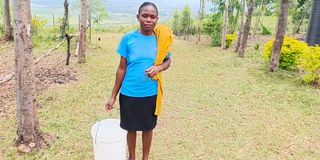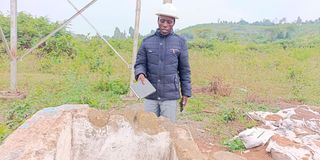The daily climb: the women trapped in a 10km a day water prison

What you need to know:
- Angoro women walk 10 kilometres daily, risking assault and exhaustion, just to collect 40 litres of water for their families.
- Their gruelling journeys to River Nyando leave them too fatigued for income-generating farm work, trapping them in cycles of poverty despite a multimillion-shilling water project that served them briefly before tanks and solar panels were vandalised.
- As they shower at the river to conserve precious water at home, these women also fight for a future where their daughters won't inherit the same burden.
The weight of the 20-litre jerrican digs into Salome Atieno Onyango's scalp as she slowly navigates the steep, rocky path leading up the hill. Sweat trickles down her face despite the early morning hour. Her muscles ache, but her steps remain steady—a skill perfected over 35 years of making this same journey.
Every day, before the sun fully rises and bathes the hills of Kisumu County in golden light, Salome embarks on a 10-kilometre round trip to River Nyando and back. Twice daily, she traverses the challenging terrain that has become both her burden and routine — a journey that defines the rhythm of life for women across Angoro village.
"The hilly terrain makes it almost impossible to make more than two trips to the river and back," she explains, adjusting the container balanced precariously on her head.
When Salome married into Angoro village more than three decades ago, her first lesson wasn't about cooking or farming — it was learning to navigate the treacherous paths to the water source five kilometres away. The older women of the community showed her how to distribute the weight evenly on her head, which routes to avoid during the rainy season, and how to conserve energy for the gruelling climb back home. Since then, these journeys have defined her daily existence.
"Our village experiences shorter periods of heavy rains, this has in turn left us water starved for the better part of the year," she says. The words fall from her lips with the ease of a truth long accepted, a hardship embedded in the very fabric of community life.
As we visit Salome in Angoro, she has just returned from fetching water alongside her daughter-in-law. Their clothes are damp with perspiration, and Salome's shoulders sag slightly from exhaustion. She describes how the extreme heat from the prolonged dry spell makes their water search increasingly challenging.
"During the hottest days, the path feels like it's on fire," she says. "The earth becomes so hot that sometimes our feet blister."
The scorching sun forces women to adapt their schedules, leaving home as early as 6am to avoid the worst of the heat. A single journey consumes nearly two hours of Salome's day—time that could be spent tending crops, preparing meals, or earning much-needed income. Upon returning, she meticulously divides the precious liquid — boiling or treating a portion for drinking, using the rest for washing utensils. After a brief rest, barely long enough for her breathing to steady, she prepares for her second trip of the day.

Salome Atieno Onyango, a resident of Angoro in Awasi, Kisumu County poses for a photo next to the newly drilled Angoro-Pala water project. The project, launched by the Kisumu County government in 2018 and completed in 2022, served villagers for just a few months.
"Most of the women prefer to shower while at the river to limit excessive use of water back at home," she explains, demonstrating with her hands how they carefully ration every drop. "The second jerrican of water is always used for cooking. On days when we have guests, we must choose between their comfort and our own needs."
In Angoro, water isn't merely a resource—it's a currency that dictates daily decisions and shapes family dynamics. Every cupful is accounted for, every splash a calculated expenditure.
The search for water isn't merely exhausting—it's becoming increasingly dangerous. Salome recounts a harrowing experience from last year when she and five other women ventured out in the dark, armed only with torches, to collect water from a seasonal swamp before it dried up in the morning. The memory sends a visible shiver through her as she speaks.
"We left at 3am when the village was still asleep," she recalls. "The darkness was so complete that our torches barely cut through it."
"On our way back, we bumped into alleged cattle rustlers with stolen cows, armed with crude weapons," she continues, her eyes widening at the memory. "We all dispersed and headed for the sugarcane plantation for safety. We decided to postpone the activity until the following day."
Her voice grows more solemn as she continues, "Women are no longer safe travelling over long distances in search of water. It is while headed to the river that sometimes our young daughters are defiled and end up with teen pregnancies."
The burden of water collection falls disproportionately on women and girls in Angoro, reinforcing gender inequalities that extend beyond household chores. Beyond the physical toll and safety concerns, the daily water journey strips these women of economic opportunities. Most women in the village work as farm hands in vast sugarcane plantations, earning a maximum daily wage of Sh200. But the water trips, which must be completed in the cooler morning hours, often make farm work impossible.
"After fetching water, going to the farms remains impossible due to fatigue," Salome sighs. "Sometimes I must choose between water for my family or food on our table."
This impossible choice is one that women across Angoro face daily—a cruel calculus of survival that prioritises immediate needs over long-term prosperity.
Schovia Anyango, another resident of Angoro village, shares similar experiences. When she first moved to the area with her husband, heavy seasonal rains provided temporary relief. Together with other women, they collected water from seasonal streams, which unfortunately dried up within a month and often contained contaminated water.
"The water from River Nyando is not any better," Schovia explains. "If not boiled or treated, the users often develop stomach complications, and going to the hospital is yet another added expense."
The health implications extend beyond immediate illness. Constant carrying of heavy water containers leads to chronic neck and back problems for many women, while the inadequate sanitation resulting from limited water access contributes to various health challenges, particularly for women during menstruation.
For those unable to make the strenuous journey to the river, purchasing water at Awasi market becomes the only alternative—six jerricans delivered by motorcycle costs around Sh200, a significant expense for families already struggling financially.
Daniel Owinga, a community representative with a commanding presence despite his gentle demeanour, confirms that the village has grappled with water scarcity for decades.
"Water scarcity is also one of the main causes of family misunderstandings," he explains, lowering his voice as though sharing a community secret. "There are men who choose not to shower while there are others who make use of the little available water in their houses to bathe, leading to family feuds."

Daniel Owinga, a resident of Angoro Village, Kisumu County poses for a photo next to the vandalised Angoro-Pala water project.
In 2018, hope briefly flickered when the Kisumu County government launched the Angoro Pala water project to provide locals with clean drinking water. The community celebrated and envisioned a future where water flowed freely from taps rather than requiring arduous journeys. The multimillion-shilling project was completed in 2022 but served villagers for only a few months before drying up, leaving behind rusting infrastructure and renewed disappointment.
"The tank and the solar panels used to pump the water were also vandalised shortly after," says Daniel, pointing to the abandoned structure visible on a nearby hilltop.
"Perhaps if the community had been more involved in its planning and protection, things might have been different." Since then, River Nyando has remained the primary water source for domestic use.
However, the community has not surrendered to their circumstances. With renewed determination, villagers have launched an awareness campaign to hold authorities accountable, working with the Civil Society Network under the Budget Action Group (Bags) project. This partnership has empowered residents to advocate more effectively for their rights.
Michael Arum, Project Manager of Bags, emphasises the disproportionate impact water scarcity has on women. "Bringing the water supply closer to the village would be a major reprieve, especially to the women who will now utilise their free time to engage in other activities," he says.
Through persistent advocacy, the community has seen some progress.
"Our frequent visits to the government offices has seen the Lake Victoria South Water Works Development Agency pick up the drilling project. We are now working to ensure the water project is relaunched," Owinga reports, a cautious optimism in his voice.
Kisumu County Chief Officer for Water, Environment and Climate Change, Erick Ogallo, acknowledges that the previous project failed due to poor security measures and insufficient community engagement. He says they have engaged partners to ensure the villagers' vision of having a clean water supply is realised, with plans incorporating local knowledge and participation from the outset.
"We are also working to secure funding in the 2025/2026 budgetary allocation to ensure that the project is a success," Ogallo promises. "This time, sustainability and security will be prioritised alongside access."
As another day ends in Angoro, Salome and countless other women prepare their jerricans for tomorrow's journey. For now, the rising sun will continue to signal the beginning of their long walk for water—a journey that defines not just their days, but their lives, generation after generation, until change finally flows as freely as the water they seek.


